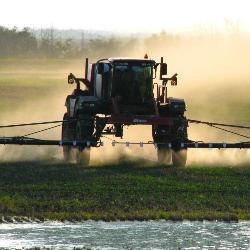Organophosphate Pesticides
Organophosphate Pesticides (OPs) are used as insecticides, fungicides, and herbicides and are applied to cotton, corn, wheat and other crops. OPS account for 50% of total pesticide sales in the U.S. for widespread uses. There are more than 40 different organophosphate pesticides registered for use in the U.S., and an estimated 77 million pounds of OPs are used annually, including 60 million pounds that are applied to crops. They are also widely used as home pesticides, given orally to livestock, used in flea collars and are applied to lawns and golf courses.
How am I exposed?
Exposures can come from workplace contact with chemicals, pesticide residues on the food we eat, products we use in our homes and on our bodies, and the quality of air and water in our communities.
Why should I be concerned?
OPs are neurotoxic to humans and animals, causing effects in the central and peripheral nervous systems. Some OPs can cause reproductive effects and damage DNA. Occupational exposures are of particular concern due to frequency of use and contact. Concerns over exposures to infants and children have been raised because there is mounting evidence that OPs can cause neurodevelopmental defects when exposure—even at low levels—occurs in utero or during critical stages of a child’s brain development.
What can government and business do?
- The US EPA should ban pesticides that are bioaccumulative, known to be hazardous and pervasive in the environment and our bodies, require pesticide manufacturers to report detailed information on the production, sales and use of their products, and make this information available to the public.
- Businesses should look to alternative methods for controlling agricultural pests like integrated pest management (IPM) and organic farming, gardening and residential pest control strategies.
How can I reduce my exposure?
- Buy USDA certified organic produce. If you are on a limited budget, look for organic choices for the produce that you eat the most of. Check out the Environmental Working Group’s Shopper’s Guide to Pesticides in Produce.
- If organic isn’t an option, make sure to thoroughly wash your fruits and vegetables before eating.
- Use alternatives to pesticides in your home and garden. There are many non-chemical methods of pest control that are safe and effective, such as using traps and barriers and removing pests physically.
Additional Resources
Lowell Center for Sustainable Production Fact Sheet: Organophosphate Pesticides
Pesticide Action Network of North America
Environmental Working Group: Shopper’s Guide to Pesticides in Produce
Toxic Free Future: Pesticides
Toxic Free Future provided content for this page.

